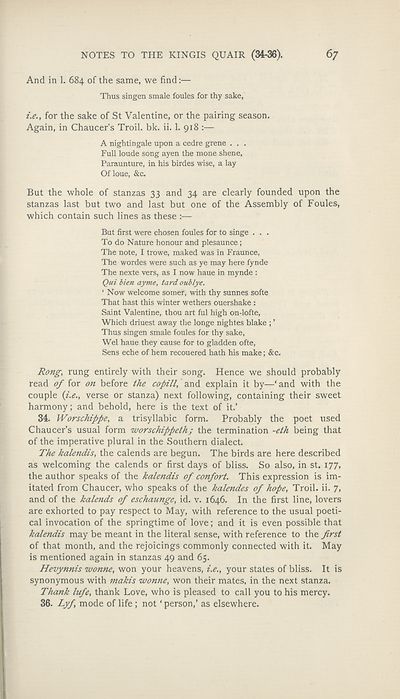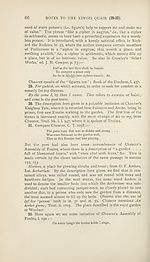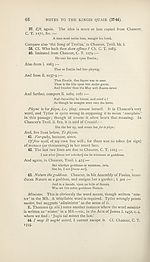Download files
Complete book:
Individual page:
Thumbnail gallery: Grid view | List view

NOTES TO THE KINGIS QUAIR (34-36).
6/
And in 1. 684 of the same, we find:—
Thus singen smale foules for thy sake,
i.e., for the sake of St Valentine, or the pairing season.
Again, in Chaucer’s Troil. bk. ii. 1. 918 :—
A nightingale upon a cedre grene . . .
Full loude song ayen the mone shene,
Paraunture, in his birdes wise, a lay
Ofloue, &c.
But the whole of stanzas 33 and 34 are clearly founded upon the
stanzas last but two and last but one of the Assembly of Foules,
which contain such lines as these :—
But first were chosen foules for to singe . . .
To do Nature honour and plesaunce ;
The note, I trowe, maked was in Fraunce,
The wordes were such as ye may here fynde
The nexte vers, as I now haue in mynde :
Qui Men ayme, tard oublye.
' Now welcome somer, with thy sunnes softe
That hast this winter wethers ouershake :
Saint Valentine, thou art ful high on-lofte,
Which driuest away the longe nightes blake ; ’
Thus singen smale foules for thy sake,
Wei haue they cause for to gladden ofte,
Sens eche of hem recouered hath his make; &c.
Rang, rung entirely with their song. Hence we should probably
read of for on before the copill, and explain it by—‘ and with the
couple {i.e., verse or stanza) next following, containing their sweet
harmony; and behold, here is the text of it.’
34. Worschippe, a trisyllabic form. Probably the poet used
Chaucer’s usual form worschippethy the termination -eth being that
of the imperative plural in the Southern dialect.
The kalendis, the calends are begun. The birds are here described
as welcoming the calends or first days of bliss. So also, in st. 177,
the author speaks of the kalendis of confort. This expression is im¬
itated from Chaucer, who speaks of the kalendes of hope, Troil. ii. 7,
and of the kalends of eschaunge, id. v. 1646. In the first line, lovers
are exhorted to pay respect to May, with reference to the usual poeti¬
cal invocation of the springtime of love; and it is even possible that
kalendis may be meant in the literal sense, with reference to the first
of that month, and the rejoicings commonly connected with it. May
is mentioned again in stanzas 49 and 6$.
Hevynnis wonne, won your heavens, i.e., your states of bliss. It is
synonymous with makis wonne, won their mates, in the next stanza.
Thank lufe, thank Love, who is pleased to call you to his mercy.
36. Lyf mode of life ; not ‘ person,’ as elsewhere.
6/
And in 1. 684 of the same, we find:—
Thus singen smale foules for thy sake,
i.e., for the sake of St Valentine, or the pairing season.
Again, in Chaucer’s Troil. bk. ii. 1. 918 :—
A nightingale upon a cedre grene . . .
Full loude song ayen the mone shene,
Paraunture, in his birdes wise, a lay
Ofloue, &c.
But the whole of stanzas 33 and 34 are clearly founded upon the
stanzas last but two and last but one of the Assembly of Foules,
which contain such lines as these :—
But first were chosen foules for to singe . . .
To do Nature honour and plesaunce ;
The note, I trowe, maked was in Fraunce,
The wordes were such as ye may here fynde
The nexte vers, as I now haue in mynde :
Qui Men ayme, tard oublye.
' Now welcome somer, with thy sunnes softe
That hast this winter wethers ouershake :
Saint Valentine, thou art ful high on-lofte,
Which driuest away the longe nightes blake ; ’
Thus singen smale foules for thy sake,
Wei haue they cause for to gladden ofte,
Sens eche of hem recouered hath his make; &c.
Rang, rung entirely with their song. Hence we should probably
read of for on before the copill, and explain it by—‘ and with the
couple {i.e., verse or stanza) next following, containing their sweet
harmony; and behold, here is the text of it.’
34. Worschippe, a trisyllabic form. Probably the poet used
Chaucer’s usual form worschippethy the termination -eth being that
of the imperative plural in the Southern dialect.
The kalendis, the calends are begun. The birds are here described
as welcoming the calends or first days of bliss. So also, in st. 177,
the author speaks of the kalendis of confort. This expression is im¬
itated from Chaucer, who speaks of the kalendes of hope, Troil. ii. 7,
and of the kalends of eschaunge, id. v. 1646. In the first line, lovers
are exhorted to pay respect to May, with reference to the usual poeti¬
cal invocation of the springtime of love; and it is even possible that
kalendis may be meant in the literal sense, with reference to the first
of that month, and the rejoicings commonly connected with it. May
is mentioned again in stanzas 49 and 6$.
Hevynnis wonne, won your heavens, i.e., your states of bliss. It is
synonymous with makis wonne, won their mates, in the next stanza.
Thank lufe, thank Love, who is pleased to call you to his mercy.
36. Lyf mode of life ; not ‘ person,’ as elsewhere.
Set display mode to: Large image | Zoom image | Transcription
Images and transcriptions on this page, including medium image downloads, may be used under the Creative Commons Attribution 4.0 International Licence unless otherwise stated. ![]()
| Publications by Scottish clubs > Scottish Text Society publications > Old series > Kingis quair > (127) |
|---|
| Permanent URL | https://digital.nls.uk/106993999 |
|---|
| Description | A collection of over 100 Scottish texts dating from around 1400 to 1700. Most titles are in Scots, and include editions of poetry, drama, and prose by major Scottish writers such as John Barbour, William Dunbar, Gavin Douglas, and George Buchanan. Edited by a key scholarly publisher of Scotland's literary history, and published from the late 19th century onwards by the Scottish Text Society. Available here are STS series 1-3. |
|---|

